Opinion
End monkey business now and get serious!
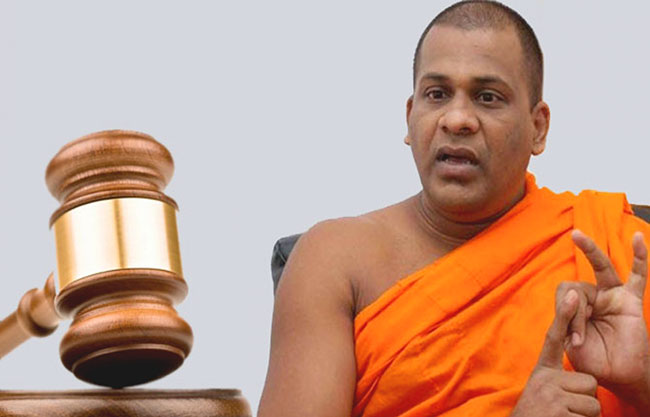
by ROHANA R. WASALA
(Continuation of ‘Don’t forget people who elected you, Mr President!’/02 November, 2021)
My gut feeling is that the Presidential Task Force, if it is what I think it is, i.e., a brilliantly thought out ploy with an ulterior motive, is meant to abort the new constitution making project. It was probably designed to divide Sinhala Buddhists and Hindu Tamils, also create suspicion between the former and Christians, while pacifying radicalized Muslims. This will help …
The PTF has been established, according to the gazette notification, “focusing on the fact that administration of justice, its implementation and protection under the law should be fair by all as set out in the Constitution of the Democratic Socialist Republic of Sri Lanka, Whereas, it is indicated under fundamental rights therein that no citizen should be discriminated against in the eye of law or meted out special treatment on ground of nationality, religion, caste or any other grounds; And whereas, the implementation of the concept; one country, one law within Sri Lanka is reflected as a methodology of ensuring nationally and internationally recognized humanitarian values; And whereas, the fact that all citizens are treated alike in the eye of the law should be further ensured, ….” This provides an idea of the brief that the PTF received.
In implicit response to the mostly negative reception of the news of its establishment among the people, Ven. Gnanasara has repeatedly tried to rationalize the One Country One Law concept; but that is unnecessary, for there is no quarrel about the cogent reasons that led to the call for the One Country One Law idea; the need for a single legal system has been correctly identified by the majority of the general public, with the negligible exception of a few religious extremists, whose established traditions come into conflict with the country’s secular laws. The question is about the rationale of the establishment of the PTF.
Through the extraordinary gazette notification, the president authorizes the task force to “make such inquiries and issue such instructions as are required for the purpose of executing the tasks so entrusted”. The President appoints, as secretary to the PTF, his Senior Assistant Secretary Ms Jeevanthie Senanayake. He further requires and directs “all public officers and other persons to whom the said Task Force may issue instructions or from whom assistance for provision of services may be requested, to comply with all such instructions, render all such assistance and furnish all such information as may be properly complied with, rendered and furnished on that behalf”.
The President demands that the PTF report to him “all instances where any Government employee or an officer in any ministry, government department, state corporation or any such institution who delay the performance of duties and fulfilment of responsibilities or fail to perform such duties and responsibilities to be entrusted by the said Task Force”. He directs the members to “submit reports to me at least once a month and submit the final report on or before 28th February, 2022”
Getting a Buddhist monk involved in governance matters (in the form of virtual nationalistic legal framing) is the last thing I would have expected from a president, who the people hoped, would bring about a systemic change in the mode of government. In Sri Lanka’s long history, the kings maintained a close relationship with the monks, only as religious advisers, not as partners in making laws or ruling. As a whistle-blower, Ven. Gnanasara Thera, exposed the existence of burgeoning religious extremism years ago, but his exposures did not get enough recognition by the authorities for some reason. Instead, he was unfairly condemned as an irresponsible rabble-rouser, intent on troublemaking for some political advantage. Ven. Gnanasara is trying to provide the initiative that only politicians and the Mahanayakes could and should provide, in resolving the single issue that has caused him to deviate from his religious vows and engage in the rough and tumble of mundane agitational activism. But he is not equipped to play that role in any way. His berserk behaviour finally landed him in jail for contempt of court. Had he been more disciplined in his protests, he wouldn’t have been thus treated, in spite of his intentions having been genuinely benign as well as patriotic. His personality defect has damaged not only his personal reputation and his cause, but also his credibility as a defender of the Buddha Sasanaya, the people and the country.
The Thera has been led astray by the cynical opportunism of politicians, who exploit the sensitive perennial issue of the threat posed to the country’s age-old Buddha Sasanaya/the Buddhist religious-cultural establishment, and to its historic archaeological heritage in the form of ruins scattered, particularly, in the north and east. The threat comes from the local representatives of forms of the religious fundamentalism that is sweeping across the whole world; especially by different sects of potentially violent Islamic/Íslamist extremists, sponsored by moneyed foreign agents. Treasure hunters cause probably more damage to this heritage. Behind the religious extremists seems to stand the Western imperialist juggernaut that uses religious fundamentalism and other forms of extremism to destabilise nation states it wants to control, to achieve varied geopolitical ends at the latter’s expense.
What the monks are demanding is protection for the Buddhist establishment from this threat. Theirs is not a political struggle; they are not fighting for political ends. What they say is: Stop unfair proselytisation of poverty-stricken Buddhists and Hindus, who are equally subject to subversion by numerous foreign funded, politicized fundamentalist Christian and Islamic sects. The problem can be easily sorted out if the politicians have the political will to do so, and if the politicians in power at any time, get the government servants working in the vulnerable areas to implement the available archaeological conservation and protection laws, without abandoning their responsibilities for illicit monetary gains. The indifference and inaction of the traditional Mahanayakes (their culpable innocence and ignorance is inexcusable) are the other strong factor that betrays Buddhist interests.
My criticism of the establishment of a Presidential Task Force for the implementation of the One Country One Law headed by a Buddhist monk does not mean a rejection of that important objective. It must be achieved during the presidency of Gotabaya Rajapaksa. For that, a proper strategy must be adopted. However, as the Bar Council of Sri Lanka, has pointed out, the PTF has no role to play in implementing the stated concept, because the functions assigned to it are already being performed by the available constitutionally established institutions, including the Parliament and the Ministry of Justice (The Island/November 3); so, it is a redundant body. The only ‘benefit’ that has accrued from the controversial move is that it has given the opportunistic minority politicians who hide behind extremists, without supporting them openly, extra ammunition for their blasts of criticism against the nationalist government.
Incidentally, the Sri Lanka Podujana Peramuna (SLPP), created by Basil Rajapaksa and led by Mahinda Rajapaksa (the current Finance Minister, and Prime Minister, respectively) held its 5th National Convention at the Nelum Pokuna Theatre, Colombo on November 2, 2021. Minister Rajapaksa emphasized the importance of MR’s leadership. President Gotabaya congratulated the party, in a message, on its great success within a short time of its inauguration, reflected in its winning of a near two thirds of parliamentary seats (in August 2020).
PM Mahinda Rajapaksa said, among other things, that the teacher strike and the farmer agitations would not have dragged on so long if they had maintained more political engagement with them. He also made special mention of the young people who voluntarily beautified towns and cities across the country with beautiful wall paintings (when the new government came into being in 2019 with the election of the current president, whose advent generated in them the new spirit of hope that inspired them to engage in that voluntary exercise without any expectation of a reward); those youths, the PM remembered, by doing that, indicated their wish that politicians should not spoil the street walls with their ugly political posters. Where are those young people now? He asked, and provided his own answer: “If they have joined the queue of passport applicants (who want to acquire a passport with the intention of leaving the country looking for greener pastures abroad), we should engage in the kind of politics that will encourage them to return”. If the PM is genuine about what he is saying here, we may expect him to stop monkeying around with monks, and to change his attitude to patriotic young politicians of all parties and communities, vis a vis his own son.
The PM must have meant what he said. If he really did, he will not relapse into the 73-year long monkey business of taking the monks for rides or flights. It is disgraceful how political monks are conducting themselves at this critical time, especially that sneaky Ratana Thera, who is causing embarrassment to Gotabaya and the government, through his hasty application (for expected personal political reputation) of the organic fertilizer initiative. Ven. Gnanasara said, talking about the PTF, that in the future the youth of the country must come forward to save the nation. The country is not short of young men and women who are capable of providing a sound modern leadership to the country, if only their way is not obstructed by ambitious oldies whose ‘Vaulting ambition, which overleaps itself, And falls on the other… ‘ (i.e., excess ambition lands them somewhere else than where they want to reach, lands them in trouble, as happened to Macbeth in the Shakespeare play).
It should be hoped that this occasion (the 5th anniversary of the SLPP) be utilised as an opportune moment to reflect on past errors, and resolve not to repeat them, and introduce a course correction, starting with rethinking a new approach to the implementation of the One Country One Law idea, that ensures the participation of all Sri Lankans; especially the young from all the communities, something that can be done through the existing agencies.
Conclusion
My gut feeling is that the Presidential Task Force, if it is what I think it is, i.e., a brilliantly thought out ploy with an ulterior motive, is meant to abort the new constitution making project. (I have no idea of whose brainchild this could be.) It was probably designed to divide Sinhala Buddhists and Hindu Tamils, also create suspicion between the former and Christians, while pacifying radicalized Muslims for some unspecified reason. This might help revive the defeated separatist project, and breathe new life into secretly growing Islamism, and together help foreign designs on Sri Lanka; provoked purely by big power geopolitics due to its strategically important location in the Indo-Pacific Ocean.
Pitting guilless Islamist critic Gnanasara Thera against an Ulama Council maulavi by putting them in the same panel of advisors, is like putting a dove and a cat in the same cage; for when it comes to religion, a believing Muslim will not compromise their religious principles to accommodate human reason.
The government’s failure to achieve its key objective of introducing a new constitution will delight the still operative forces, which were behind the 2015 regime change (they may even have acquired new allies by now). It is good to remember that Mahinda Rajapaksa was betrayed by his lieutenant three times in a row between 2015 and 2019, which does not reflect well on his sense of judgement; it could be a different traitor this time.
President Gotabaya Rajapaksa is probably the most ethically and morally honest person ever to hold that post. The frustrated regime changers are now propagating the faint fictitious notion that he benefited from the April 2019 Easter Sunday Islamist bombings, and that the intelligence services that had reached the highest professional efficiency levels under him as Defence Secretary during MR’s time had some connection with them. The charge that the government is deliberately slow in meting out justice to those responsible for the Easter bombings is, I think, 100% false. All peace- and justice-loving Sri Lankans, including me, want to see the Easter attacks perpetrators receive condign punishment at the earliest possible; the highest involved (be it president Sirisena, prime minister Ranil, during whose watch the suicide bomb attacks happened or any other individuals) shouldn’t be spared. I, for one, believe that President Gotabaya, PM Mahinda, and others in the government will be satisfied with no less.
However, even the Cardinal seems to have accepted that false allegation, in spite of repeated assurances given him by the President to the contrary. Two reasons for the Cardinal’s misgivings that occur to me are: potentially guilty former president Sirisena seems to be looking for refuge under his erstwhile boss that he betrayed three times, now PM; the other reason could be Gnanasara Thera’s arrogant, totally frivolous and uncalled for remarks about the Cardinal’s activism regarding the Muthurajawela environmental issue. Gnanasara Thera was reported as having said about the Cardinal in this connection: “I warn the Cardinal that he should not overstep his boundaries!” That alone should have disqualified the monk for the post that he has been appointed. I personally believe that the President, as a convinced Buddhist, can receive much more constructive advice from the Cardinal than from Gnanasara Thera.
The paragraph quoted below is about one of the academics that I find mentioned as a panel member of the PTF. It happens to be the concluding paragraph of an article of mine that was carried in the Lankaweb online journal on May 1, 2020 (Interested readers may look it up there: http://www.lankaweb.com/news/items/2020/05/01/academic-adolescents-against-the-nationalist-cause/):
“It is strange that this academic was not informed enough about the existing local realities (not exclusively those uncovered with evidence by the BBS – Bodu Bala Sena) relating to the problem of the menace posed to Sri Lankans of all races and religions and worldviews, especially to Sinhala Buddhists and Tamil Hindus who together form over 80% of the population, from Abrahamic religious fundamentalists (not from the mainstream adherents of those religions), when he wrote to that international journal. These monks do ‘deliberate on their views and stances before involving the public…’; there is nothing wrong with their actions, but what can they do if they are misreported to the world by indifferent media, and immature ill-informed academics? (A personal opinion)”
Finally, when the disciplined voters of the country (unfortunately, they don’t have enough disciplined politicians to serve them) voted for a new president and a new parliament about two years ago, they never expected a yahapalanaya type of government to come to power again, whatever happens later. Apparently, the country hasn’t still emerged from its afterglow. Gotabaya Rajapaksa started off with the purest intentions. Buddhists believe in the principle “dhammo have rakkhati dhammacari” the dhamma protects the follower of the dhamma”. He need not fear. But whatever he is intent on doing, he should first win the agreement and support of the people before trying it.
Anyone with an average familiarity with the recent political history of the world, knows that patriotic leaders of independent countries who don’t serve the interests of more powerful nations, at the expense of the welfare and wellbeing of their own people, are not safe. Their safety depends on the people’s goodwill, provided democracy is allowed to rule. But as we know today, countries find themselves ruled from outside. That is an unpleasant reality, we can hardly overcome. In Sri Lanka, the two traditional parties or alliances have two different attitudes to this predicament. One favours it, the other opposes it. The second has a problem managing foreign interference. Nationalists support forces that protect the country’s democracy, independence, and sovereignty. Gotabaya is a nationalist leader. Nationalists need not be demoralised when they are falsely attacked as ethno-nationalist extremists by NGO mercenaries.
If Gotabaya Rajapaksa is able to bring in a new constitution as a non-party product that is fashioned according to the common consensus of all parliamentarians (including essentially all young ones, that is, those under 40, for example) who do not have to vote for it under duress; let that be the greatest achievement he will be remembered for.
Such a constitution should be one that does not divide the nation on language, religion, or race bases. It will eliminate the influence of extremists, and definitely incorporate the One Country One Law principle. Giving anything a special place or special protection, as experience shows, invariably turns out to be counter-productive. So, this has to be avoided. This is a controversial suggestion, but it will be achievable, if the gerontocrats give way for the brilliant youth of the country to take centre stage in the political arena.
Opinion
Education needed about people not feeding wildlife
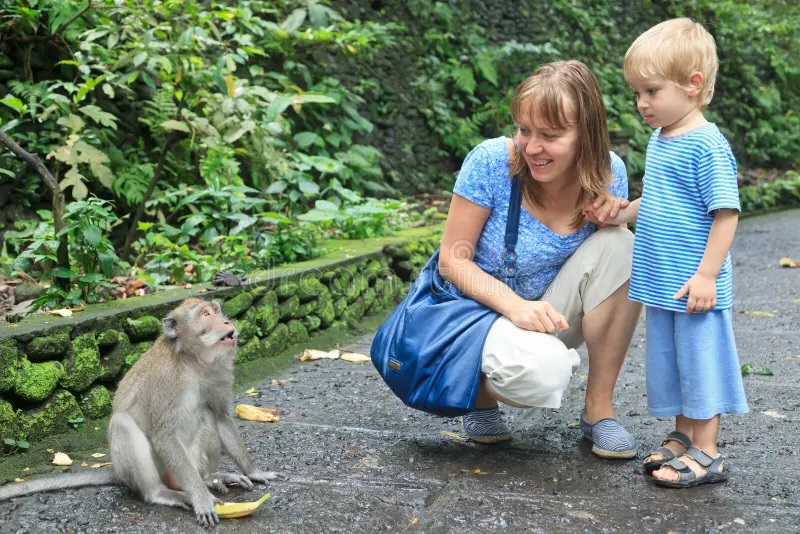
Being wildlife enthusiasts and bird watchers we took a river “safari” during a recent family trip to Bentota. We were dismayed to see that it seems to be the standard practice to feed the monkeys, I think they were the purple faced langurs, that were encountered on the river banks. Each boat that passed by stopped with boxed fruit, coconut and other odds and ends to feed them.
We managed to stop our guy from doing so but faced derision and laughter that we shouldn’t be afraid of monkeys. We tried to explain to him that this is a plague affecting Sri Lanka; elephants being fed on road sides and even in national parks, monkeys being fed from hotel balconies and apparently during river boat rides, birds being fed on hotel terraces etc.
This was met with further mockery and amused dismissal. An effort to make them understand that this was their livelihood that they were destroying it in this manner sailed over their heads. They even have a picture of a baby crocodile on the shoulders of a tourist on their billboard.
We need to consider the following:
Educate such tour operators about the importance of not interfering with the environment and the behaviour of wild animals.
Include education and training in the hotel school, and in schools in tourist resort towns about their duty and responsibility to the environment and the ecosystem on which we all depend.
If it is not already the case such operators should have licenses that should be revoked and fined if found to be engaging in such destructive acts.
Tamara Nanayakkara
Opinion
Capt. Dinham Suhood flies West

A few days ago, we heard the sad news of the passing on of Capt. Dinham Suhood. Born in 1929, he was the last surviving Air Ceylon Captain from the ‘old guard’.
He studied at St Joseph’s College, Colombo 10. He had his flying training in 1949 in Sydney, Australia and then joined Air Ceylon in late 1957. There he flew the DC3 (Dakota), HS748 (Avro), Nord 262 and the HS 121 (Trident).
I remember how he lent his large collection of ‘Airfix’ plastic aircraft models built to scale at S. Thomas’ College, exhibitions. That really inspired us schoolboys.
In 1971 he flew for a Singaporean Millionaire, a BAC One-Eleven and then later joined Air Siam where he flew Boeing B707 and the B747 before retiring and migrating to Australia in 1975.
Some of my captains had flown with him as First Officers. He was reputed to have been a true professional and always helpful to his colleagues.
He was an accomplished pianist and good dancer.
He passed on a few days short of his 97th birthday, after a brief illness.
May his soul rest in peace!
To fly west my friend is a test we must all take for a final check
Capt. Gihan A Fernando
RCyAF/ SLAF, Air Ceylon, Air Lanka, Singapore Airlines, SriLankan Airlines
Opinion
Global warming here to stay

The cause of global warming, they claim, is due to ever increasing levels of CO2. This is a by-product of burning fossil fuels like oil and gas, and of course coal. Environmentalists and other ‘green’ activists are worried about rising world atmospheric levels of CO2. Now they want to stop the whole world from burning fossil fuels, especially people who use cars powered by petrol and diesel oil, because burning petrol and oil are a major source of CO2 pollution. They are bringing forward the fateful day when oil and gas are scarce and can no longer be found and we have no choice but to travel by electricity-driven cars – or go by foot. They say we must save energy now, by walking and save the planet’s atmosphere.
THE DEMON COAL
But it is coal, above all, that is hated most by the ‘green’ lobby. It is coal that is first on their list for targeting above all the other fossil fuels. The eminently logical reason is that coal is the dirtiest polluter of all. In addition to adding CO2 to the atmosphere, it pollutes the air we breathe with fine particles of ash and poisonous chemicals which also make us ill. And some claim that coal-fired power stations produce more harmful radiation than an atomic reactor.
STOP THE COAL!
Halting the use of coal for generating electricity is a priority for them. It is an action high on the Green party list.
However, no-one talks of what we can use to fill the energy gap left by coal. Some experts publicly claim that unfortunately, energy from wind or solar panels, will not be enough and cannot satisfy our demand for instant power at all times of the day or night at a reasonable price.
THE ALTERNATIVES
It seems to be a taboo to talk about energy from nuclear power, but this is misguided. Going nuclear offers tried and tested alternatives to coal. The West has got generating energy from uranium down to a fine art, but it does involve some potentially dangerous problems, which are overcome by powerful engineering designs which then must be operated safely. But an additional factor when using URANIUM is that it produces long term radioactive waste. Relocating and storage of this waste is expensive and is a big problem.
Russia in November 2020, very kindly offered to help us with this continuous generating problem by offering standard Uranium modules for generating power. They offered to handle all aspects of the fuel cycle and its disposal. In hindsight this would have been an unbelievable bargain. It can be assumed that we could have also used Russian expertise in solving the power distribution flows throughout the grid.
THORIUM
But thankfully we are blessed with a second nuclear choice – that of the mildly radioactive THORIUM, a much cheaper and safer solution to our energy needs.
News last month (January 2026) told us of how China has built a container ship that can run on Thorium for ten years without refuelling. They must have solved the corrosion problem of the main fluoride mixing container walls. China has rare earths and can use AI computers to solve their metallurgical problems – fast!
Nevertheless, Russia can equally offer Sri Lanka Thorium- powered generating stations. Here the benefits are even more obviously evident. Thorium can be a quite cheap source of energy using locally mined material plus, so importantly, the radioactive waste remains dangerous for only a few hundred years, unlike uranium waste.
Because they are relatively small, only the size of a semi-detached house, such thorium generating stations can be located near the point of use, reducing the need for UNSIGHTLY towers and power grid distribution lines.
The design and supply of standard Thorium reactor machines may be more expensive but can be obtained from Russia itself, or China – our friends in our time of need.
Priyantha Hettige
-

 Business4 days ago
Business4 days agoAutodoc 360 relocates to reinforce commitment to premium auto care
-

 Midweek Review4 days ago
Midweek Review4 days agoA question of national pride
-

 Opinion3 days ago
Opinion3 days agoWill computers ever be intelligent?
-

 Midweek Review4 days ago
Midweek Review4 days agoTheatre and Anthropocentrism in the age of Climate Emergency
-

 Editorial6 days ago
Editorial6 days agoThe JRJ syndrome
-
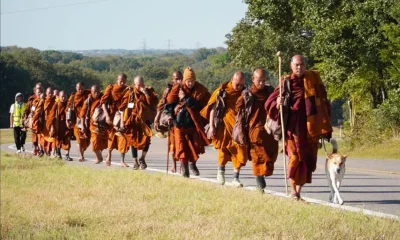
 Opinion4 days ago
Opinion4 days agoThe Walk for Peace in America a Sri Lankan initiative: A startling truth hidden by govt.
-
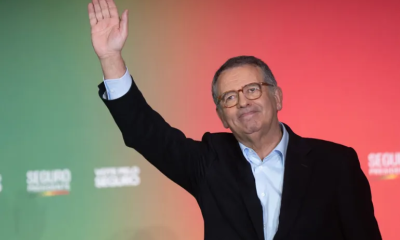
 Foreign News6 days ago
Foreign News6 days agoPortugal elects Socialist Party’s Seguro as president in landslide
-
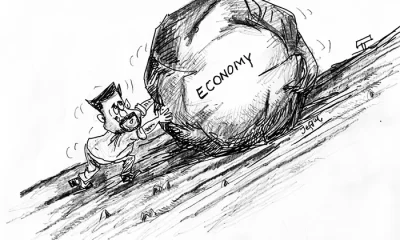
 Opinion5 days ago
Opinion5 days agoBeyond 4–5% recovery: Why Sri Lanka needs a real growth strategy













